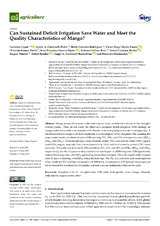Can Sustained Deficit Irrigation Save Water and Meet the Quality Characteristics of Mango?
Autor
Lipan, Leontina
Carbonell-Pedro, Aarón A.
Cárceles Rodríguez, Belén
Durán-Zuazo, Víctor Hugo
Franco Tarifa, Dionisio
García-Tejero, Iván Francisco
Gálvez Ruiz, Baltasar
Cuadros Tavira, S.
Muelas, Raquel
Sendra, Esther
Carbonell-Barrachina, Ángel A.
Hernández, Francisca
Editor
MDPIFecha
2021Materia
Mangifera indica L.Drought stress
SDI
Yield
Fruit quality
Color change
Minerals
Antioxidants
Sugars
Dietary fiber
METS:
Mostrar el registro METSPREMIS:
Mostrar el registro PREMISMetadatos
Mostrar el registro completo del ítemResumen
Mango is one of the most cultivated tropical fruits worldwide and one of few drought-tolerant plants. Thus, in this study the effect of a sustained deficit irrigation (SDI) strategy on mango yield and quality was assessed with the aim of reducing irrigation water in mango crop. A randomized block design with four treatments was developed: (i) full irrigation (FI), assuring the crop’s water needs, and three levels of SDI receiving 75%, 50%, and 33% of irrigation water (SDI75, SDI50, and SDI33). Yield, morphology, color, titratable acidity (TA), total soluble solids (TSS), organic acids (OA), sugars, minerals, fiber, antioxidant activity (AA), and total phenolic content (TPC) were analyzed. The yield was reduced in SDI conditions (8%, 11%, and 20% for SDI75, SDI50, and SDI33, respectively), but the irrigation water productivity was higher in all SDI regimes. SDI significantly reduced the mango size, with SDI33 generating the smallest mangoes. Peel color significantly changed after 13 days of ripening, with SDI75 being the least ripe. The TA, AA, and citric acid were higher in SDI75, while the TPC and fiber increased in all SDI levels. Consequently, SDI reduced the mango size but increased the functionality of samples, without a severe detrimental effect on the yield.

